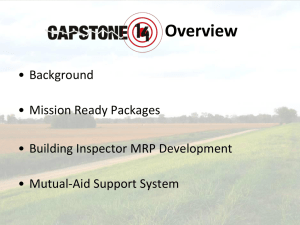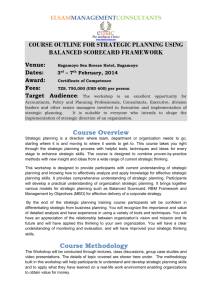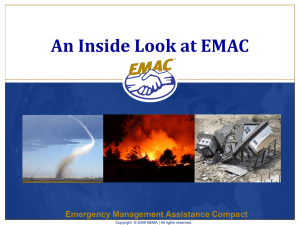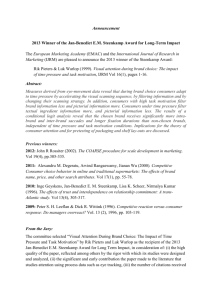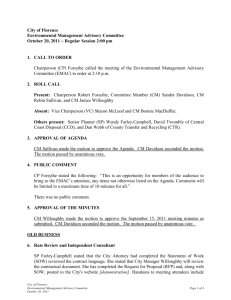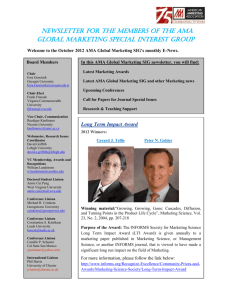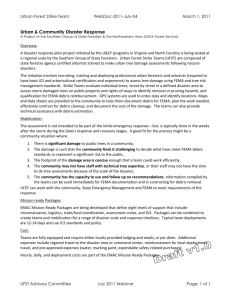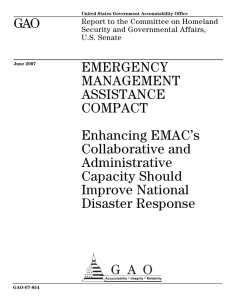What is EMAC? - The Council of State Governments
advertisement
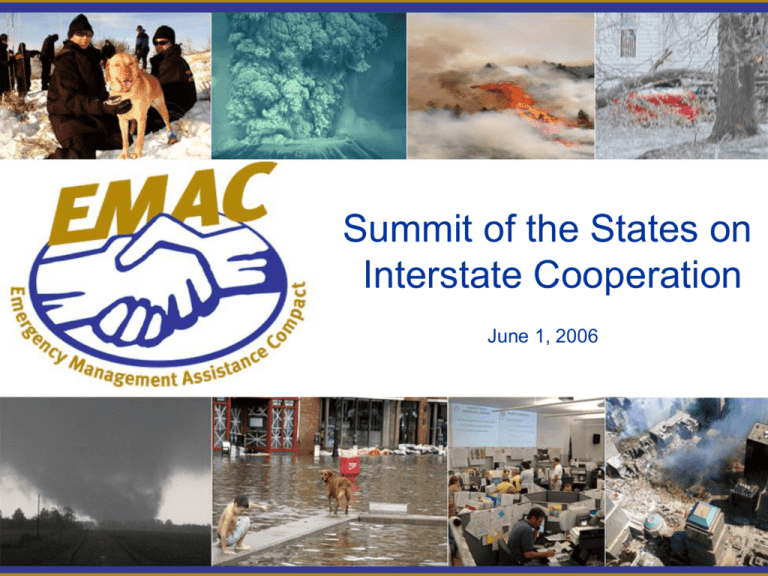
Summit of the States on Interstate Cooperation June 1, 2006 What is EMAC? EMAC, Emergency Management Assistance Compact, is a nationwide interstate mutual aid compact that facilitates the sharing of resources, personnel and equipment across state lines during times of disaster and emergency. EMAC is formalized into law by member parties. EMAC Span of Control Operation Levels Level 3 Level 2 Level 1 Disaster Operation Components Functions National Coordinating Group (NCG) State of the Chair of EMAC for that year Control Function EMAC A-Team Co-located with State/Federal Personnel In the appropriate requesting state EOC Action Function National Coordinating Team (NCT) Co-located with FEMA EST at the NEOC DHS/FEMA HQ, Washington, D.C. Regional Coordinating Team (RCT) Co-Located with Federal ESF’s at the DHS/FEMA Regional OPS Center Coordination Functions All 2005 EMAC Events Total # of REQ-A Missions: 2,234 Total # of Personnel 66,197 Total $ estimated cost # of National Guard Missions: Total National Guard Personnel Total National Guard $ estimated cost $837,107,877.63 972 46660 $500,836,521.25** # of State Missions 1,216 Total State Civilian Personnel 19514 Total State Civilian $ estimated cost $336,261,958.29 ** Under Title 32, National Guard costs do not have to be tracked under EMAC Total EMAC Response Current 3/24/2006 Total Estimated EMAC Response to Hurricanes Katrina and Rita (Florida, Louisiana, Mississippi, Alabama, Texas, NCT, and RCT): 65,919 Personnel Deployed* 19,431 Civilian 46,488 National Guard $829.5 M Estimated Cost* *Notes: Still have pending missions awaiting signatures – have 30 days from verbal agreement to signature Costs and Personnel Numbers are Finalized in Reimbursement Hurricane Katrina Current 3/24/2006 Mississippi Louisiana 8/28- EMAC A-Team deployed 8/29 – Katrina made landfall 8/27- EMAC A-Team deployed 8/29 – Katrina made landfall 1001 Requests for Assistance 37,477 Personnel deployed* 7779 Civilian 29,698 National Guard $425.9M Estimated cost* 894 Requests for Assistance 23,973 Personnel deployed* 10,407 Civilian 13,566 National Guard $345.5M Estimated cost* Image courtesy of NOAA Total Estimated EMAC Response to Katrina (LA & MS): 1895 Requests for Assistance 61,450 Personnel Deployed 18,186 Civilian 43,264 National Guard $771.5M Estimated Cost *Notes: Still have pending missions awaiting signatures – have 30 days from verbal agreement to signature Costs and Personnel Numbers are Finalized in Reimbursement Hurricane Rita Current 3/24/2006 Louisiana Texas 172 Requests for Assistance 4,134 Personnel deployed* 1,022 Civilian 3,112 National Guard $55.7M Estimated cost* 80 Requests for Assistance 234 Personnel deployed* 158 Civilian 76 National Guard $2.0M Estimated cost* Image courtesy of NOAA Total Estimated EMAC Response to Rita (LA & TX): 252 Requests for Assistance 4,368 Personnel Deployed 1,180 Civilian 3,188 National Guard $57.7M Estimated Cost *Notes: Still have pending missions awaiting signatures – have 30 days from verbal agreement to signature Costs and Personnel Numbers are Finalized in Reimbursement Lessons Learned Lessons Learned 1. EDUCATION!!! 2. Training and Exercises 3. Enhance EMAC’s resource tracking system, including accountability for deployed personnel 4. Resource typing of assets 5. Logistics: Better define living conditions and safety concerns for deployments EMAC Background EMAC History • 1992 - Concept of Emergency Management Compact Conceived by Southern US Governors • 1993 - Adopted as Southern Regional Emergency Management Assistance Compact • 1995 – Agreement broadened to EMAC – NEMA (National Emergency Management Association an affiliate of the Council of State Governments) became administrator • 1996 – Endorsed by National Governor’s Association & FEMA for Nationwide Use • 1996 - Ratified by US Congress and Signed into Law (PL 104-321) What does EMAC do? EMAC does: EMAC does NOT: • Maximizes use of all available resources • Coordinates deployment of EMAC resources with National Response Plan resources • Expedites and streamlines delivery of assistance between member states • Protects state sovereignty • Provides management and oversight • Replace federal support • Alter operational direction and control • Move resources from county to county, city to city, or locality to locality. All EMAC resources must be from state to state. County, local, and other personnel/resources must work through the state emergency management office • Endorse self-deployments Who are the members of EMAC? 50 states, the District of Columbia, Puerto Rico and the U.S. Virgin Islands have enacted EMAC legislation. May 2006 EMAC Applications •State/Local EOC Support •Damage assessment •Disaster recovery •Logistics •Donations management •Security •Communications •Fire fighting •Aviation support •Biological/chemical events •Medical personnel/resources •Hazard mitigation •Community outreach •Search and rescue •Debris clearance •Information & planning •Public Health •Hazardous materials •Human services/mass care •Animal control •Information/planning •Terrorist events any capability of member states can be shared with member states EMAC Activation (simplified) 1. 2. 3. Governor issues state of emergency Authorized Representative from the affected state alerts EMAC National Coordinating Group (NCG) Affected State requests A-Team Deployment or uses in-house EMAC A-Team trained personnel 4. A-Team works with state: Determine needs /requests assistance via EMAC Operations System 5. A-Team helps state determine costs and availability of resources 7. Resources are sent to affected state 6. States complete requisitions and negotiation of costs 8. Responding state requests reimbursement 9. Responding state reimbursed Why is EMAC Successful? EMAC Effectiveness • Administrative Oversight & Support Staff - Formal Business Protocols • Addresses Important Legal Issues – Reimbursement, Licensure, Workers’ Compensation & Liability • Standard Operating Procedures • Continual Improvement – 5-year Strategic Plan - Critiques/Training/Exercises/AAR/CA Meetings • Customized Technology Development • Active membership EMAC Governance Structure NEMA - National Emergency Management Association National Coordinating Group & Chair NEMA – EMAC Committee EMAC Executive Task Force Past Chair & Chair Elect 10 Lead State Members 3 At Large Members EMAC Coordinator EMAC Sr. Advisor Member State Responsibilities • Educate Emergency Management Staff & State & Local Agencies on EMAC Processes • Train A-Team Members on EMAC Operations • Develop & Maintain Procedures for A-Team Activation • Develop & Maintain Procedures for Requesting/Providing Assistance • Evaluate Procedures Through Exercises The Compact’s Language EMAC Key Provisions • “…the state rendering aid may withhold resources to the extent necessary to provide reasonable protection for such state.” • “…licenses, certificates, or other permits…shall be deemed licensed, certified, or permitted by the state requesting assistance." EMAC Key Provisions • “Employees . . . rendering aid . . . shall be considered agents of the requesting state for tort liability and immunity purposes” • “. . . any party state rendering aid . . . shall be reimbursed by the party state receiving aid for any loss or damage to or expense incurred . . .” (requesting state) Intrastate Mutual Aid Legislation NEMA encourages states to develop intrastate mutual aid agreements for political subdivisions within their state. The existence of an agreement & mechanism to draw on local resources allows those resources to be shared quickly & efficiently. For more information, visit www.emacweb.org EMAC Success Stories EMAC meets the needs of citizens during disasters through a unified effort among the member states EMAC Success Stories • Inclusion of Critical Local Personnel & Equipment - some states agreed to make local government employees “agents of the state” for purposes of EMAC - some states entered into agreements with local governments to move resources through EMAC EMAC Success Stories • Increased communication & coordination with other national associations, such as: • National Conference of Mayors • Counties • National Guard Bureau/Adjutants General • Healthcare • Law Enforcement Community • Fire Community EMAC Success Stories • Increased national visibility of the emergency management profession & states helping states (inclusion in the after action report process/speaking engagements) Contact Information For more information about EMAC contact: Angela Copple EMAC Coordinator National Emergency Management Association acopple@csg.org
